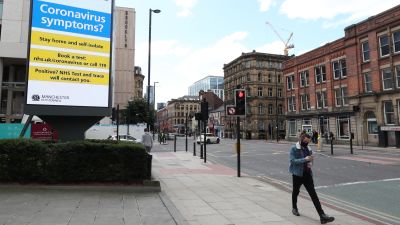Coronavirus: New laws enforcing north west restrictions yet to be implemented, government admits

Laws underpinning new lockdown restrictions for Greater Manchester, parts of east Lancashire and West Yorkshire are yet to be implemented - four days after they were introduced, the government has admitted.
Ministers said the restrictions – placing bans on people from different households meeting following a spike in coronavirus cases – were effective from midnight on Friday.
When the changes were announced, officials said new regulations were needed to make them legally enforceable.
Guidance published on Friday stated that it would be against the law for people from different households to meet in a private home or garden – unless they are part of a support bubble – and warned of £100 fines for those who flout the rules.
Officials said the laws were due to be signed off and published later that night, while Downing Street said on Monday powers to curb travel in and out of hotspots may be introduced.
ITV News Correspondent Damon Green reports from Manchester:
But on Monday afternoon the Department of Health and Social Care confirmed it was yet to implement laws bringing the rules into force.
It said it was trying to make the changes legally enforceable as soon as possible but insisted the rules still applied from July 31.
When asked by the PA news agency why there was a delay and on what legal basis the rules were currently being enforced, the department refused to comment.
Major incident declared in Greater Manchester as coronavirus infection rates rise
‘Shrouded in secrecy’: Top scientist calls for more transparency on Covid-19 decision-making
New 'game-changing' coronavirus tests can diagnose Covid-19 and flu in 90 minute
But on this occasion, so far this has been unable to happen due to the delay in publishing the laws, it is understood.
The new restrictions apply to Greater Manchester, including the City of Manchester, Trafford, Stockport, Oldham, Bury, Wigan, Bolton, Tameside, Rochdale and Salford.
They also apply to Blackburn with Darwen, Burnley, Hyndburn, Pendle and Rossendale in Lancashire, and Bradford, Calderdale and Kirklees in West Yorkshire.
Similar restrictions will also apply to Leicester, which saw the first so-called “local lockdown” imposed on June 29.
Health Secretary Matt Hancock announced the decision in a series of tweets on Thursday after there had been an increasing rate of transmission in parts of Northern England.
Muslims celebrating Eid in the affected areas were urged not to host or visit friends and family in each other’s homes or gardens and not to meet friends and family in other venues – including restaurants or cafes.
The government faced criticism for unveiling the new restrictions late at night and just hours before they came into force, with some saying this prompted confusion in the communities affected.
While supportive of the measures, Greater Manchester mayor Andy Burnham told the BBC on Friday he had concerns about the way they were announced and said the lack of immediate detail was “disorientating” for the public.
Meanwhile Downing Street said powers to ban movement in and out of coronavirus hotspots could be used to curb the spread of Covid-19. Officials confirmed the measures – which could include shutting down transport networks – would be considered if needed to prevent a spike in cases. London Mayor Sadiq Khan hit out at “totally unacceptable” reports that the capital could be effectively cut off from the rest of England if there was a surge in cases there, but Downing Street insisted no specific plans for the UK’s biggest city had been drawn up.
However, Number 10 acknowledged that measures to effectively ban travel around hotspots in England were part of the armoury to combat the disease. The “Contain” framework drawn up by officials in July sets out “the possibility of putting in place restrictions on travel if there is an area that is particularly badly affected”, the Prime Minister’s official spokesman said. “One of the steps within that potentially includes closing down local transport networks,” the spokesman said. “It’s there, it’s contained in the document, it’s not a new thing – we have informed the public and politicians of that being a potential action that we could take. “But, to be clear, it’s not something that is specific to London or anywhere else.”